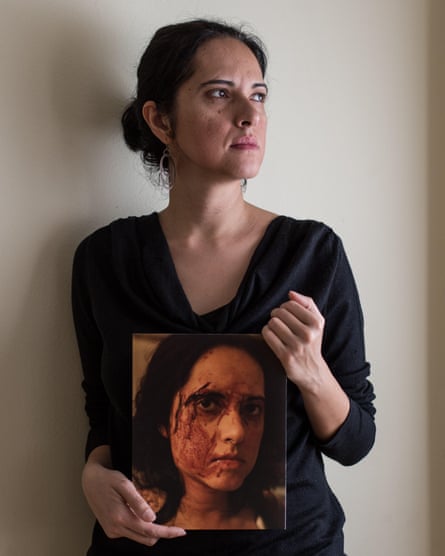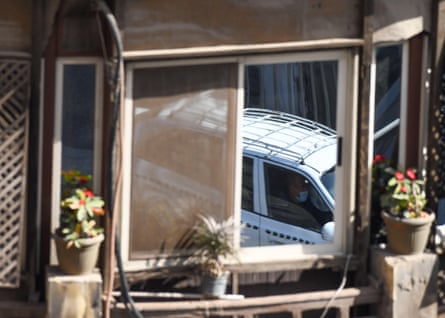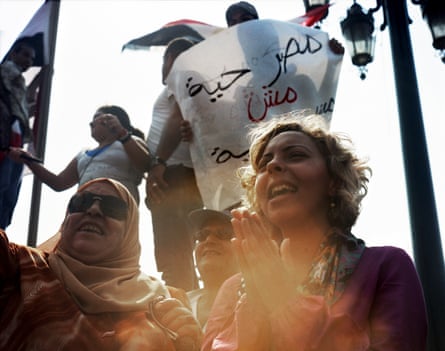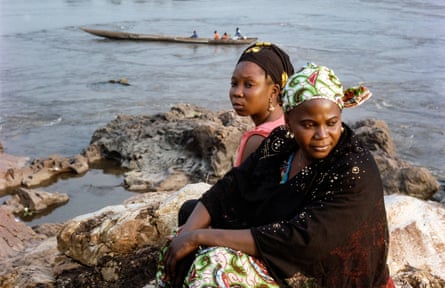
A few weeks ago, I had a difficult conversation with my teenage daughter. It came out of something that happened to me more than a decade ago, and which changed the course of my life and work.
As a documentary photographer, I have travelled the world, taking portraits of survivors of trauma who shared their testimonies with me. It is a finely balanced exchange, in which they give me their trust, and my pictures attest to their resilience. But for many years, there was always a distance between us, created by the violence they had endured – a gulf I could not cross.
On the road, I have experienced many nights in random places, bad hotels, nocturnal drives along deserted highways. I have stayed awake all night, unable to sleep behind a door closed with a feeble latch, watching the shadows of men lurking in hallways. Often, I had no choice but to entrust my safety to strangers, some of whom gave me great support, while others made me feel threatened. While travelling on assignment, I have learned to be hypervigilant, always predicting a dangerous scenario and trying to avoid it.
In March 2012, I was subject to an attack. And it happened not in a shabby motel in some faraway place, but at home, in Cairo.
It was in the aftermath of the Arab Spring, that tortured period between a popular uprising and a military coup. Crime was on the rise. Gangs of bandits released from state prisons roamed the streets of the city, while the defunct police force sat back and watched. At the time, I often photographed people around the city. Even though the atmosphere was unsettled, I still felt like a free agent. I let my guard down.
On the night of the assault, I was on my way to meet a friend at the Cairo Opera House. I stopped a cab right outside my home in Maadi, an affluent suburban neighbourhood. We drove through the deserted streets of Old Maadi, with its decaying villas and endless roundabouts, relics of a colonial era. The empty streets made me think of the insulated lives of the wealthy. How untouchable they are, fenced off and tucked away in their ornate, gilded Louis-Farouk-style interiors.
Living in Cairo as an expat from Azerbaijan, I was among the sheltered class. While parts of the city crumbled, we had everything delivered to our homes, including groceries and alcohol. Our gates were protected by the bawabs, the faithful doormen who chased away strangers and street vendors on donkey carts. That night, I was going from Maadi to another wealthy neighbourhood, Zamalek, in an air-conditioned car with a seat belt and a taxi meter. I felt safe.

The traffic along the Nile riverbank drew to a halt. I beckoned to the driver to take the next exit and hit the ring road. Silently he nodded and made a swift turn on to a four-lane highway. Under the bridge, felucca boats blinking with lights glided over the black river surface like giant fireflies, blasting sha’abi tunes that echoed the car horns. I sat back and closed my eyes.
We began to move faster on the ring road, manoeuvring between cars. There were no street lamps along the road any more. When I peered through the darkness, I saw the outlines of identical red-brick housing blocks on each side of the road. This was definitely not the way to Zamalek, I thought. We were, in fact, speeding along the desert road, which led to Faiyum, south-west of Cairo.
For a second, I thought he was taking me on a giant loop just to jack up the fare on the meter. “Where are we going?” I asked in my basic Egyptian Arabic, which now had a tinge of annoyance – that unmistakable sense of entitled irritability many expats express when they realise they’re being swindled. With a slight delay, the driver replied: “Zamalek.” I caught a glimmer of contempt in the way he half-turned towards me, but without looking me in the eye.
“This is not the way to Zamalek!” I said. “Stop the car, I am getting out!”
This time he did not even turn, but continued driving, going faster. I looked at the back of his neck, strangely thin and frail. Illuminated by a passing car, his empty eyes were reflected in the rearview mirror. “Stop now!” I shouted in English. I heard the clicking of the central door lock. He made a U-turn and slowed down, finally parking next to a pile of construction rubble on the side of the road.
It was completely dark, except for the headlights of cars flashing on the highway as they flew by. I was more angry than scared. Wrong instinct. I should have got out and run the moment he stopped the car, but I hesitated. Before I managed to get the door open, a sharp, shiny object was pressed against my inner thigh. A knife. I finally took a good look at his face – narrow eyes, clouded with drugs or alcohol. It was the angular face of a man who could be both too young and too old for his age.
He told me to get undressed, gesticulating with the knife. I took my leather jacket off and handed it to him. He then gestured for me to take my shirt off too, but instead, I made a move for the door. He leapt forward and headbutted me. One, two, three blows, and my vision began to blur. I wasn’t sure if I was losing consciousness or if it was the blood getting in my eyes. Terrified of fading out, I summoned all my mental powers to stay awake and keep my eyes open. At this point I realised that he had pushed his driver’s seat back against my chest, which pinned me down, but at the same time, sheltered my body from his.
My thoughts were moving faster than my body, and my consciousness split in two: part of me was watching from outside myself and prompting me, telling me what my next move should be, like a football coach. I knew I needed to get out of the car. I kept reaching for the door, but he kept hitting the central locking switch. I unlocked it, he locked it. Back and forth. Each time I managed to open the door and get half of myself out of the car, he grabbed me by the hair and pulled me back inside. He continued punching me. My phone was in my hand. I used its sharp corners to hit him in his temple and tried for that space between his eyes.
I tried to reason with him, told him I had money in my purse and he could just take it, about $800. “I will not report you to the police. I am a mother and a foreigner, just let me go,” I pleaded with the man. “Mesh a’aiz fulus,” he said, and hit me again. I don’t want your money.
Cars zipped past us without stopping. When I managed to open the door and crawl halfway out, I hoped someone would see me dangling and bleeding from the side of his car. A passing car began to slow down and pull over. The taxi driver caught a glimpse of it. “Meshi, fulus,” he said. I’ll take the money. “No police, OK?” He pounded me one more time in the face to reinforce his point. He took my phone, handbag and jacket. I scrambled out of the car and ran.
Should I have turned back to check that he was not following me? Should I have memorised his number plates? I did not. I just wanted to get home. I had no choice but to hail another taxi, trust another driver. A cab approached. This time a younger driver, whose face seemed kind. He saw that I was badly beaten, my face pulsating and swollen, with the blood gushing from the wound above my eyebrow, my clothes spattered with blood.
I told the taxi driver my home address. He kept apologising, keeping eye contact with me in the mirror. He kept pointing at the road signs, reassuring me that he was taking me home. “Maadi, OK?” He said, as we drove towards the highway exit. His kindness broke through my stupor and made me feel human again. I burst into tears of relief.
When I got home, my two-year-old daughter woke up and called me from the bedroom. I didn’t want her to see me, so I rushed into the bathroom, where, in the mirror, I caught sight of my face covered with blood for the first time.
I decided to snap a picture of myself for evidence, and put my bloodied clothes in a plastic bag. Naively, I thought I would take them to the police later for DNA sampling. Then I crept out of the house.
The taxi driver waited outside to take me to the hospital, where I was examined by the emergency doctors. They told me they were obliged to call the police since it was a case of assault. The MRI did not reveal any serious head injuries. I had a concussion and needed stitches for my face wound. The doctors advised me to wait for a plastic surgeon to make sure my eyebrow was correctly realigned, and to minimise the scarring.
As I was waiting for the plastic surgeon to arrive, a female nurse came in to ask me if I needed a gynaecological examination. I said there was no need, because I hadn’t been raped. Bruises were visible from the blows he delivered on my upper body, chest and shoulders. She asked if I was sure about it, giving me a questioning look, as if doubting my recollection of events. For a second, I wondered: what if he had indeed raped me and I blocked it out of my memory? But no, I remembered his car seat covering my body. The nurse left, but came back a short time later, bringing in a gynaecologist – a more authoritative figure. He took his turn and insisted he should examine me just to make sure. I repeated there was no need.
The young taxi driver refused to take my money. He stuck around for the police interrogation, since he had picked me up from the crime scene. I caught a glimpse of his face, timid and honest, surrounded by police officers who were rude to him, trying to intimidate him. He persevered throughout a three-hour interrogation and was forced to write a report. I was told to write an account of the events as I remembered them. Then write it again, and again.
The next day, after a sleepless night, I went to the police station in 6th of October, a sparsely populated satellite city along the desert road. I walked along the dusty corridors, past rooms with walls not thick enough to contain the screaming of the people inside. I found a police officer sitting at his desk, and he asked me to fill out more paperwork. I had to hand write several copies of my report because they did not have a copying machine, let alone a computer.
The policeman questioned my statement when I told him that I got away and was not raped. “Are you sure he didn’t do it? Because we could put him away for a long time,” he assured me. I told him that I would still like to see the man caught and punished, because he would most likely do it again to someone else. “Is it not a serious crime still, an attack on someone?” I asked. “It happens … ” he shrugged. I showed him my clothes in the plastic bag, but he sneered at me. “We’re not like the CSI Miami,” he said. I took the clothes away with me, and kept them in a bag unwashed for months.
Several weeks later, the police station called me in again. I was told they had found a man who fitted the description of the assailant, and that my phone had been traced to him. I couldn’t face going alone, and brought along a female friend. I imagined I would be led into a room with a one-way mirror, where I wouldn’t be seen by anyone on the other side. Instead, they took us to a room and sat us down on a small dilapidated sofa. In walked a tall young man, who stood right in front of us, then turned sideways, left and right, before being led away. No, it wasn’t him, I said, shocked by their decision to make me face a possible perpetrator in the same room.
The police never called back. My anger mounted as the days went by without any progress on my case. My embassy wrote a complaint on my behalf to the Egyptian Ministry of Interior, demanding a proper investigation. A few weeks later, the Ministry of Interior sent a response to the Azerbaijani embassy informing them that they had deported a woman, an Azerbaijani national, whom they accused of prostitution. A diplomat I met told me this was the ministry’s coded yet unambiguous way of telling the embassy to drop the case.

In the aftermath of the Egyptian uprising that toppled President Hosni Mubarak, harrowing accounts of abuse on Cairo’s streets had begun to gain wider coverage in the media. Gangs of men attacked female journalists and activists on Tahrir Square. Some female protesters were raped in broad daylight, while others were rounded up by the military, and beaten and tortured in custody. Some were forced to undergo degrading virginity tests. Reading these reports angered me in a way that was new and personal. I was haunted by the idea of my assailant walking free and repeating the same crimes with impunity.
For nearly a year after the assault, I had held on to the photograph of my bloody and battered face, but was too ashamed to share it. “It will be good for your social media engagement. This kind of stuff goes viral,” one of my friends, a blogger and activist, told me. But this was precisely the reason why I did not want to do it. The thought of my face invoking an outburst of pity online made me cringe with anxiety. I feared that, just like the gynaecologist and the policeman, everyone else would assume that I had been raped and label me a victim. I hesitated to share an image of myself in a state of defeat.
But when activist groups organised a demonstration in support of survivors in downtown Cairo, I finally gathered strength and posted my photograph, and the story of what happened to me, on Facebook. I called on women to stay on their guard and encouraged people to join the rally.
After years of photographing victims of sexual violence, I was exposing myself as a survivor. I was now “the story” and I felt out of place, unsettled – not in my usual comfort zone behind the camera. I spent the rest of the day checking the number of likes and shares as they ticked up and up. Just like my blogger friend had predicted, my crude anti-selfie went viral. Thousands of people responded, and a steady stream of sympathetic comments and messages followed. Men apologised on behalf of the taxi driver, while women expressed condolences that a horrible thing like this had happened to me.
Several months later, I deleted my Facebook post. I didn’t want to be defined or remembered by the trauma I had experienced. This was not my real face, I thought. But, years later, in support of the #MeToo movement, I shared the image again to open a dialogue on the subject of social stigma around sexual assault. This time, the face stayed online.
It’s been 12 years since the Cairo attack, and my daughter and I now live in Istanbul. She is 14 years old and follows me on social media. She hasn’t seen my aftermath selfie, and for years I worried she might find it online. Last month, I finally told her about the incident. I felt it was important that she learned it from me and not the internet. I told her that for all these years, I had not wanted to scare her with the picture and its story, and that I made it public to encourage others to come forward. “I am not ashamed,” I told her.
“You shouldn’t be,” she said.
On social media, we try to project an image of success, a mask of happiness to inspire envy, not pity. My selfie did the opposite. After my first decision to post the picture, and my subsequent withdrawal of it, it took me years to overcome the feelings of shame. I dreaded being labelled a victim, and for my daughter to see me in that light. The reaction I craved was not sympathy or compassion. It was anger, pure rage.
A few years after the attack, I was travelling in the Central African Republic, on a commission from the International Criminal Court to photograph victims of crimes against humanity.
After the Cairo incident, I was drawn to documenting stories of sexual assault survivors around the world. From conflicts in the Democratic Republic of the Congo, Central African Republic, Côte D’Ivoire, Bosnia and Serbia, where rape was used as a weapon of war, to the Native American communities living in relative peace on reservations across the US, where the victims of historic generational trauma perpetrated the same crimes against their own family members.
In Bangui, the capital of the Central African Republic, at the office of an NGO that assisted survivors of gender-based violence, I met Aisha. She was a single mother from a Muslim militia-controlled district in Bangui that had been besieged by Christian militias during the country’s protracted sectarian conflict.

I told Aisha about what happened to me in Cairo, and showed her the photograph of my bruised and bloodied face. I told her it did not equate to her own experience, but the feeling of shame and a sense of violated pride were familiar to me. Aisha took a quick glance at the picture, which I kept on my phone, and nodded. A reflection of kindred anger flashed in her eyes, as she sat up straight and said in a cold and resolute tone: “It happened twice. First time it was a gang rape.”
Tall and strong, dressed in a matching robe and headscarf with her hair tucked away, Aisha wore chunky, gold-coloured earrings and was wrapped in a black shawl embroidered with crystal beads. Her friend Ramatou, a fellow survivor, young and slender in a pink dress and a white headdress, listened to Aisha with a half-extinguished gaze. She had probably heard the story a dozen times, yet she listened carefully, her silence punctuated with empathetic nods.
In 2002, amid a five-month-long terror campaign of rape, mass murder and pillage led by the Congolese warlord Jean Pierre Bemba’s militias in the Central African Republic, armed men entered Aisha’s family home and shot her brother in the legs to stop him from fighting off the attack. Five of these men then took turns to gang-rape Aisha and her brother’s wife.
Aisha’s family decided to hush up the incident in order not to ruin her prospects of marriage. They moved to a different area of the city to start a new chapter for her and keep her reputation untainted. A decade later, a sectarian conflict unfolded between two militant groups, engulfing the entire country in a brutal civil war. By then, Aisha had a husband and three children, and was pregnant with a fourth. She remembered the exact day on 24 February 2014 when armed militants broke into her home while her husband was away. Threatening to kill one of her children if she did not obey, they abducted Aisha and brought her to an abandoned building. One of the group’s leaders walked in and ordered her to undress. He then proceeded to penetrate her with a sharp end of a rocket shell.
Once he was done, he ordered his men to lock her in a shed and kill her the next morning. For hours, Aisha sat in the room, bleeding and full of dread, until she heard one of the guards whisper through the crack in the door: “I don’t approve of this. I am leaving the door open at night, if you are strong enough to run, just go.”
Dressed in nothing but underwear and bleeding from her wounds, Aisha ran through the night until she reached a cluster of houses, where she met women who gave her some clothes. When she reached home and told her husband about the rape, he got angry and took off, abandoning her and their three children. Following the assault, Aisha miscarried her fourth child. She has not seen her husband since, while her prospects of marrying again faded to zero with the stigma of rape.
I went for a walk with Aisha and Ramatou along the Oubangui river, close to a hotel where expat women and aid workers were sunning themselves and splashing about in the pool. Aisha rarely ventured out of her besieged, militia-governed district, and being among strangers made her uncomfortable. She only left her home once a week to attend group meetings with other survivors of rape. This is where she met Ramatou.
In a neat and breezy room with orange curtains blocking the afternoon sun, women from the opposite sides of the sectarian divide sat on plastic chairs, chatting and laughing. Shunned by their own communities, they found sisterhood here.
A common thread between survivors was that most kept quiet about their abuse. Even women in countries with a functioning justice system often did not report their offenders. Some had to face them regularly at work or family gatherings, since their parents, friends and relatives discouraged them from taking the incidents to the police because of stigma and shame.
For many victims, reporting rape could be dangerous. Those brave enough to come forward could be ostracised, left without support and care, or in extreme cases murdered in so-called honour killings. As a result, many were forced to tuck away their trauma into a hidden corner of the past, never to be revisited. While their society turned a blind eye to these injustices, they remained silent, with the anger brewing inside them.
I once heard the Congolese surgeon and Nobel peace prize laureate Denis Mukwege, who treated tens of thousands of rape victims in his hospital in Bukavu, say: “It’s the perpetrators who should be ashamed of their crimes, not the victims.”
There is dignity and bravery in Aisha’s story of survival. Something to take pride in, not to hide. I don’t judge the silence of sexual assault survivors, but I condemn the stigma around them. Aisha and Ramatou had the courage to tell their stories. And for that, they deserve respect and admiration, not pity.